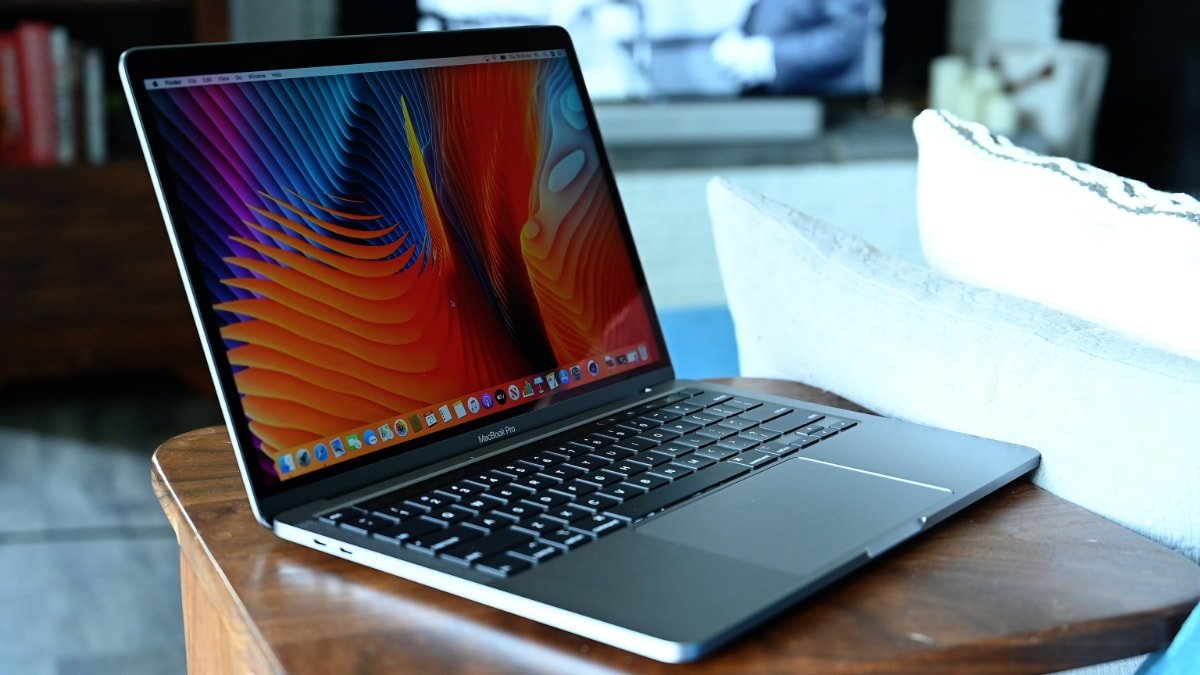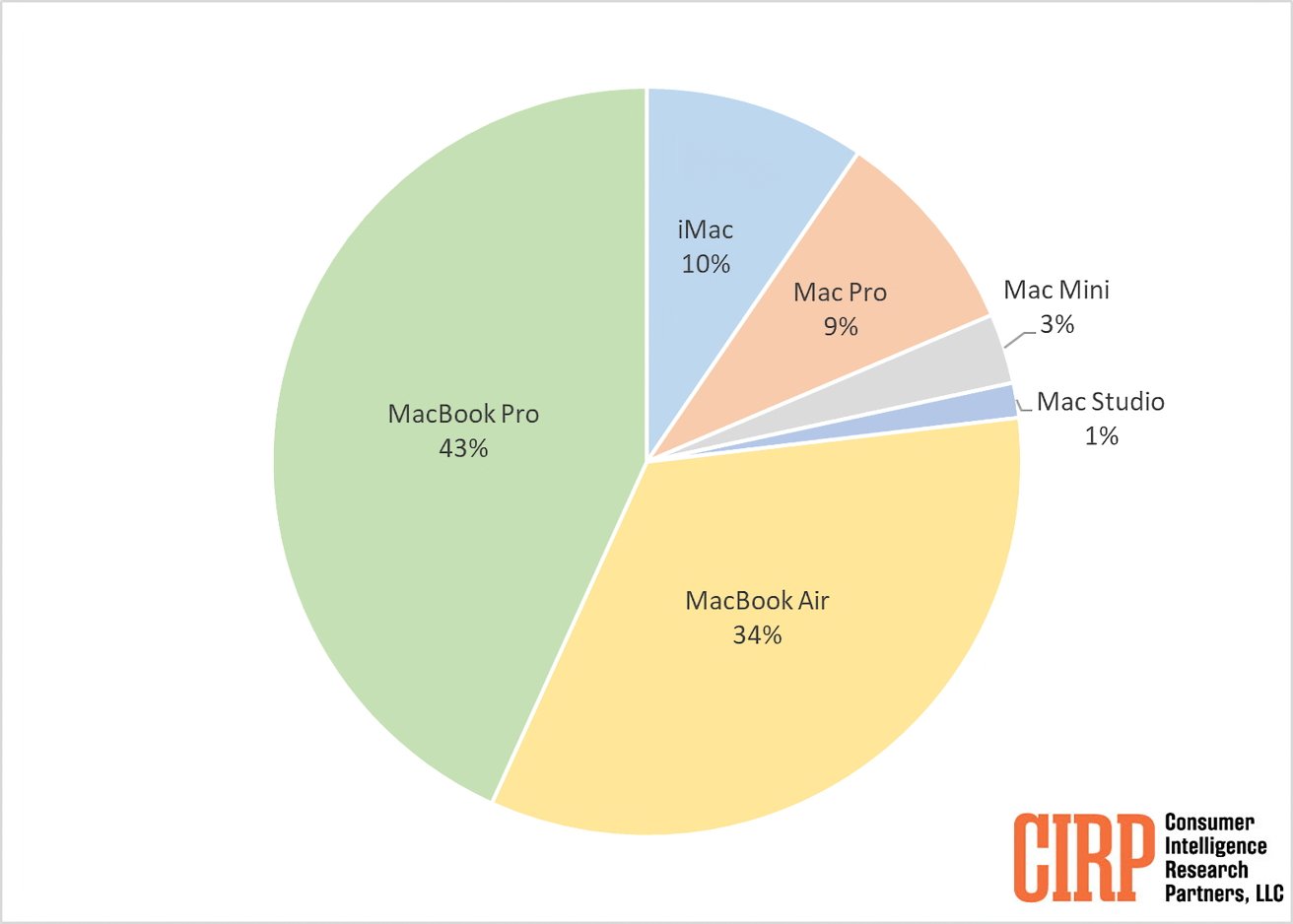What keeps the Mac relevant for Apple, despite iPhone dominance
The Mac continues to enjoy strong consumer demand and serves a crucial purpose in supporting the functionality of the iPhone and the upcoming Vision Pro headset.

Consumer demand for Mac remains strong
At the recent WWDC keynote, Apple unveiled the Vision Pro mixed-reality headset and updates to the Mac lineup. New machines include an upgraded Mac Studio, Apple Silicon Mac Pro, and a 15-inch MacBook Air.
While Mac sales may lag behind mobile products like the iPhone, they still hold significant importance within Apple's ecosystem, according to the newest report from Consumer Intelligence Research Partners (CIRP).
Mac laptops are the most popular, representing over 75% of Mac computer sales in the most recent twelve months. Within the laptop category, the MacBook Pro models, both high-priced and high-powered, make up over half of the laptop sales and over 40% of all Mac computer sales.
On the other hand, the MacBook Air models, known for their more affordable price range, contribute nearly one-third of the total Mac sales, while the remaining 46% of laptop units fall into this category.
Within the desktop category, the iMac holds a modest yet significant 10% share of total sales and approximately half of all desktop sales. In contrast, the high-end Mac Pro represents almost half of the Mac desktop sales and 9% of all Macs.

Popularity of Mac models in the last twelve months
But despite the power of the Mac Studio and the low price point of the Mac mini, these two models represent a tiny fraction of Mac sales at 1% and 3%, respectively.
In general, while Apple is often perceived as a mobile technology company due to the immense popularity of the iPhone, the Mac still holds substantial importance within its ecosystem. And there's a good reason for that.
While Apple's mobile products may be more popular, they rely on the power of the Mac through Xcode. Xcode is a development environment for macOS that lets developers create apps for Apple's operating systems.
Xcode is a crucial and powerful tool not found on mobile devices. While developers can use Swift Playgrounds on the iPad to create apps and submit them to the App Store, it lacks the extensive capabilities of Xcode, such as debugging, version control, and support for external libraries.
"Development for visionOS starts with Xcode, which includes the visionOS SDK," Apple says on its webpage. As a result, neither the iPhone nor Vision Pro threaten the Mac -- for now.
Read on AppleInsider

Comments
Why would you call it BS based on what you said? It's obvious that the apps written for those 2B iPhones (as well as however many iPads there are out there) were written on Macs. So whether it's 1 or 10m or 1B developers - they all used Macs. And they're 100% necessary for those developers. What's more relevant than 100% necessity?
But I do think the author is being a bit narrow-minded for sure. I'm also a developer who uses a Mac. And I don't write iPhone or iPad apps - I develop Java apps as well as web apps and the Mac is simply the best development tool available. The only Apple-specific 'Xcode' tool I ever really use is notarytool (to sign my app installers on Mac). Being UNIX based, most of, if not all, the tools available to Linux users are available right out of the box on Macs too. But on top of that, it's got a great *and consistent* GUI - something Linux, after 30 years of existence, still hasn't managed - and a good breadth commercial software offerings. And one never has to worry about this driver and that driver not working on a Mac.
You're making my point. Xcode has little to do with what makes the Mac relevant for Apple. I'd bet there are far more VSCode installs than Xcode installs, and EASILY there are more Mac owners who have never touched any developer tool of any kind, but need or want a Macintosh regardless of what other Apple hardware they own. The Mac stands as important irrespective of Xcode.
Mac’s and the development environment Apple has created around them and the Apple operating systems, used on all of the Apple platforms are vital to Apple’s iPhone future, and that also includes all SOC hardware development. The article title seems to imply that one has nothing to do with the other, they are interconnected, and one cannot be successful without the other they are joined at the hip.
Obviously, there are plenty of users that choose to use Macs for any number of activities, whether for content creation, basic office apps, or for specialized purposes. Surely, all non-developer applications must represent a huge (if not major) percentage of uses.
And so far as Macs supporting "mobile products," I note with interest that the majority of Macs are themselves mobile products, given the percentage (whether dollars or quantities) of MBP and MBA indicated in the graph. The power and flexibility of these products is what makes them so popular--and relevant.
The Mac ain't going away anytime soon. It is powered by one of the official OS's supported by Apple. Period.
Ever try working on spreadsheets on an iPhone?
Apple reported their Mac revenue as $40b last year. The iMac sells around 3 million units. If the Mac Pro sold 3 million units at $7k+, it would make over $21b, more than half their Mac revenue so obviously wrong number used.
I suspect they misplaced the labels for mini and pro. The Mac mini at $599 will be 9%. The Mac Pro is less than 1% of sales.
Roughly 28m Macs sold
Macbooks are around 80% (22m) of Macs sold at ASP $1200-1300 = $26-28b
iMacs are around 10% (2.8m) at $1400 = $4b
Mac mini ASP is likely $700-800 x 5% (1.4m) = $1b
Mac Studio ASP is likely $2.5-3k x 5% (1.4m) = $4b
Mac Pro ASP is likely $8k x <0.5% (<150k) = <$1b
$28 + 4 + 1 + 4 + 1 = $38b. Adjust some ASP and percentage here and there will add to $40b but that's roughly how it would look.
Mac sales are strong because they make the best OS and the best laptops by a wide margin. Even premium $3k+ PC laptops look 3rd rate next to Macbook Pros.